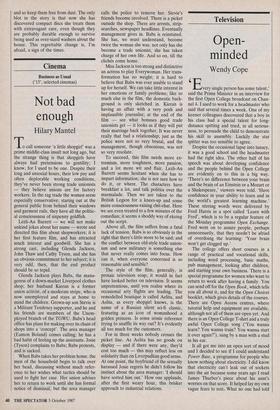Cinema
Business as Usual (`15', selected cinemas)
Not bad enough
Hilary Mantel
To call someone 'a little shopgirl' was a prime middle-class insult not long ago, but the strange thing is that shopgirls have always had pretensions to gentility; I know, for I used to be one. Despite their long and unsocial hours, their low pay and often deplorable working conditions, they've never been strong trade unionists — they believe unions are for factory workers. In the rag trade the women seem especially conservative; staring out at the general public from behind their windows and garment rails, they have all the politic- al consciousness of sixpenny goldfish.
Lezli-An Barrett — we will not make unkind jokes about her name — wrote and directed this film about shopworkers; it is her first feature film, and has attracted much interest and goodwill. She has a strong cast, including Glenda Jackson, John Thaw and Cathy Tyson, and she has an obvious commitment to her subject; it is very odd, then, that the end product should be so tepid.
Glenda Jackson plays Babs, the mana- geress of a down-market Liverpool clothes shop; her husband Kieran is a former union activist, of a moderate stripe, who is now unemployed and stays at home to mind the children. Grown-up son Stevie is a Militant Tendency supporter, and he and his friends are members of the Unem- ployed branch of the TGWU. Babs's head office has plans for making over its chain of shops into a 'concept'. The area manager (Eamon Boland) comes calling; he has a bad habit of feeling up the assistants. Josie (Tyson) complains to Babs; Babs protests, and is sacked.
When Babs takes her problem home, the men of the household begin to talk over her head, discussing without much refer- ence to her wishes what tactics should be used to fight her case. Her union advises her to return to work until she has formal notice of dismissal, but the area manager calls the police to remove her. Stevie's friends become involved. There is a picket outside the shop. There are arrests, strip- searches, newspaper headlines. Eventually management gives in. Babs is reinstated. She has, we must understand, become twice the woman she was: not only has she become a trade unionist, she has taken charge of her own life. And so on, till the clichés come home.
Miss Jackson is too strong and distinctive an actress to play Everywoman. Her trans- formation has no weight; it is hard to believe that Babs was ever unable to stand up for herself. We can take little interest in her emotions or family problems; like so much else in the film, the domestic back- ground is only sketched in. Kieran is having an affair with a very posh and implausible journalist; at the end of the film — see what bonuses good trade unionists get — it looks as if they will put their marriage back together. It was never really that bad a relationship; just as the police were not so very brutal, and the management, though obnoxious, was not so very resolute.
To succeed, this film needs more ex- tremism, more toughness, more passion, and a lot more wit and flair. Lezli-An Barrett seems hesitant when she has to impart information; she is not sure how to do it, or where. The characters have breakfast a lot, and talk politics over the marmalade. Then we are taken to the British Legion for a knees-up and some more consciousness-raising chit-chat. Here we are even treated to a few minutes of the comedian; it seems a shoddy way of ekeing out the script.
Above all, the film suffers from a fatal lack of tension. Babs is so obviously in the right that there's little more to be said; and the conflict between old-style trade union- ism and new militancy is something else that never really comes into focus. How can it, when everyone concerned is so reasonable and sensible?
The style of the film, generally, is prosaic television soap; it would in fact have looked better on television. It seems unpretentious, until you realise where its occasional arty flights are leading. The remodelled boutique is called Aelita, and Aelita, as every shopgirl knows, is the name of a Russian silent sci-fi classic, featuring as an icon of womanhood a golden princess. Is some ironic reference trying to snuffle its way out? It's evidently all too much for the customers.
For in three weeks nobody crosses the picket line. As Aelita has no goods on display — and if there were any, they'd cost too much — this may reflect less on solidarity than on Liverpudlian good sense. At one point, the boyfriend of the sexually harassed Josie regrets he didn't follow his instinct about the area manager: 'I should have sorted him out.' How one applauds, after the first weary hour, this brisker approach to industrial relations.


















































 Previous page
Previous page